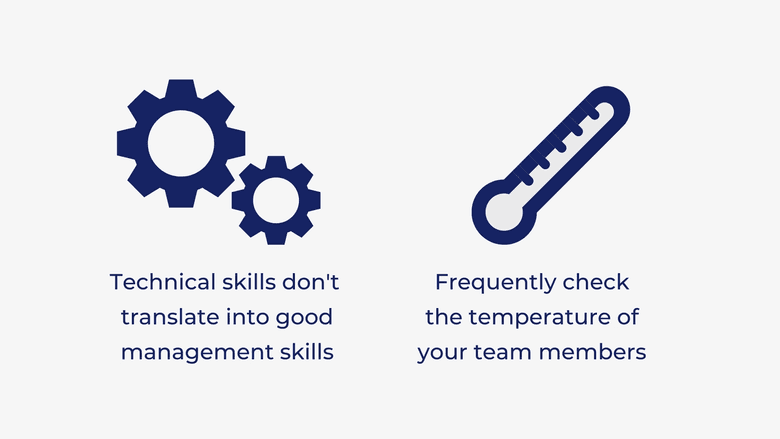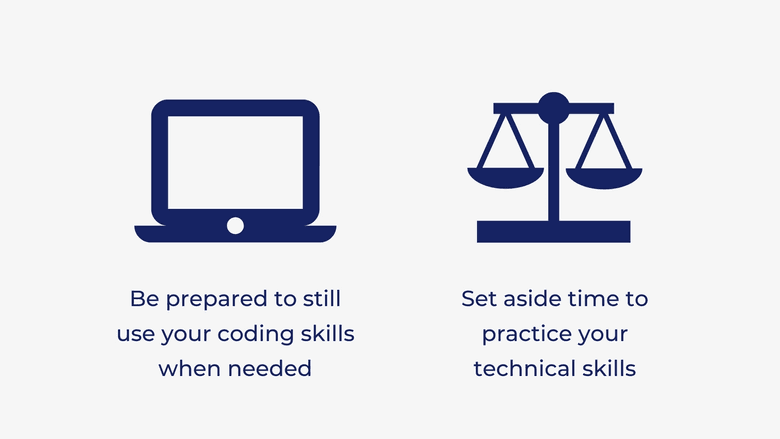5 Habits of Highly Effective Engineering Managers
Managing engineers is definitely harder than herding cats
What is an engineering manager?
The engineering manager’s primary concern is each individual team member: hiring, delegating, coaching and offering guidance to make sure they perform well. EM's understand the team’s dynamic, how it evolves over time with new hires, and how people respond to pressure. They continually refine product development processes to keep the team on deadline and on target.
Most newly minted EMs struggle to step back from the hands-on coding they did as ICs and focus instead on project management, motivating and supporting engineering teams, and working with engineers 1:1 to improve their problem solving and communication skills. While you won't read this in any job description...
The engineering manager role is part camp counselor, part technical leader, and part program manager. It's a challenging role no engineering experience as an IC can prepare you for. So how do you make this a positive experience for yourself and your team? Here are five things that separate a good EM from an outstanding one.
1. They differentiate between management and technical leadership

What makes you a good engineer doesn’t make you a good manager
Most EMs are former individual contributors faced with HR responsibilities and direct reports for the first time. As engineers, they’re tempted to systematize every process -- scheduling one-on-one meetings at X frequency to discuss Y topics, measuring employee performance using overly exacting methods, or micromanaging. Management is about adapting to your environment and the needs of your direct reports, for which there is no formula. Processes are your tooling, not your solution, so be prepared to let go of certain preconceived notions.
Management skills can be hard to cultivate, especially in engineering management where you have to keep an eye on the people, the codebase, and the senior stakeholders.
Great EMs will make time to check the temperature of the team often:
- Host one-on-one meetings with individual team members in addition to your daily team standup.
- Track the long-term goals and performance of your direct reports by keeping a file and adding notes after meetings, and refer to these goals during their annual performance review.
- Schedule coaching sessions with a team member who’s struggling, cheer on your team when deadline pressures reach breaking point, and be sure to praise (and reward) good work.
2. They constantly develop their empathy and people strategy

Trust your team’s judgment and capabilities, and if you don’t know the answer to something, admit it and promise to help find a solution. Management can be a very humbling experience. You’ll work with ICs ten times more proficient at executing than you are, take the hit when a project fails, and make important triaging decisions in the face of competing objectives. The best managers take it in stride, and learn how to develop their empathy and interpersonal skills to better manage unexpected setbacks.
Delegating is difficult; so is saying, “I don’t know.” As an EM, you must learn to do both
The job is to translate business objectives into detailed plans and deliverables and assign them to the right people. That's not just about being a good project manager, it's about recognizing who on your team is the best fit for a task and why.
An effective EM knows their team members
Additionally, they can judge a junior developer’s capabilities and assigns her work that she finds challenging, but doesn’t crush her. It's a fickle balance to pair your team with the right engineering projects, while keeping everyone motivated.
You should also know which senior engineers prefer autonomy and which ones want to weigh in at every meeting, and adapt accordingly to make sure they both have a positive work experience.
Motivating your team through tough times is another key skill
You must know how to triage and reboot that stalled project everybody dreads, or help developers offload nonessential tasks from their JIRA boards when it’s crunchtime and they’re feeling overwhelmed.
Engineering manager jobs are more about people than business administration or operations management. If you want the job just so you can be " the boss", think again - this role is all about supporting the engineering team.
3. They maintain their ability to be deep technical thinkers

Most EMs still make important decisions about the technology stack and get involved in engineering activities. In some organizations, they may even double as a software architect or tech lead, which means taking charge of budgets and production timelines and assuming profit-and-loss accountability. If a team is understaffed, you might spend a lot of time coding, debugging, or being quality assurance.
As a technical leader, you still need to be able to review the codebase and help team members work through technical blockers. But your full time job is to manage, you won’t have much time to practice coding or learn a new programming language during regular business hours.
The balance between management and coding
Technical skills decline quickly from disuse, so many EMs swing back-and-forth between management and an IC role to keep their coding skills fresh.
If your organization doesn’t provide such wiggle room, set aside time to practice coding, stay up-to-date by subscribing to tech newsletters and read engineering books, or ask the company about professional development funding to take a course or attend a conference.
4. They get the best ideas out of their team

Software design is a collaborative effort. One person might propose the initial idea, but team members will have many follow-up conversations about specifications and architectural constraints before a software development plan is made.
Host architecture jams or brainstorming sessions early in the design process; this yields more immediate feedback, ensures more people are invested in the product and helps you catch blind spots sooner.
Make sure everyone agrees on what problem you’ll solve, lay out the constraints and principles that need to be accounted for, and close with a clear outcome.
Finally, create an environment where people feel comfortable pitching far-fetched ideas, giving honest feedback and asking for help or advice. You do this by having consistent management principles: having an open-door policy, asking your team members for their opinions even if you’re the one who ultimately makes the decisions, and taking time to get to know each employee on a personal level.
5. They manage up to get the right resources for their team

Maintaining a cordial relationship with upper management is key to landing budgets for projects and ensuring your team is recognized and rewarded for their hard work.
An engineering manager, you will also deal with politics so your team doesn't have to- you have to manage your Director of Engineering's expectations and
In the long term, it’s also important for general buy-in when your team wants to launch a new initiative or experiment. If a junior worker is underpaid or overdue for a promotion, advocate for them. If a senior developer expresses a disinterest in management, don’t push for them to take on more responsibility. You're the mouthpiece for the team to senior management - and ensuring promotion and employment opportunities for the team falls on you.
The information provided herein is for general informational purposes only and is not intended to provide tax, legal, or investment advice and should not be construed as an offer to sell, a solicitation of an offer to buy, or a recommendation of any security by Candor, its employees and affiliates, or any third-party. Any expressions of opinion or assumptions are for illustrative purposes only and are subject to change without notice. Past performance is not a guarantee of future results and the opinions presented herein should not be viewed as an indicator of future performance. Investing in securities involves risk. Loss of principal is possible.
Third-party data has been obtained from sources we believe to be reliable; however, its accuracy, completeness, or reliability cannot be guaranteed. Candor does not receive compensation to promote or discuss any particular Company; however, Candor, its employees and affiliates, and/or its clients may hold positions in securities of the Companies discussed.
